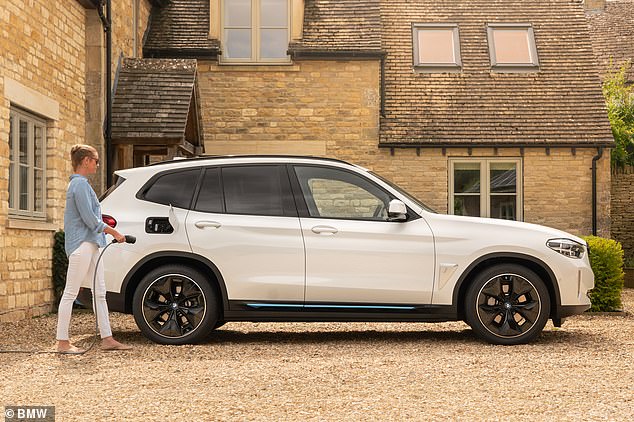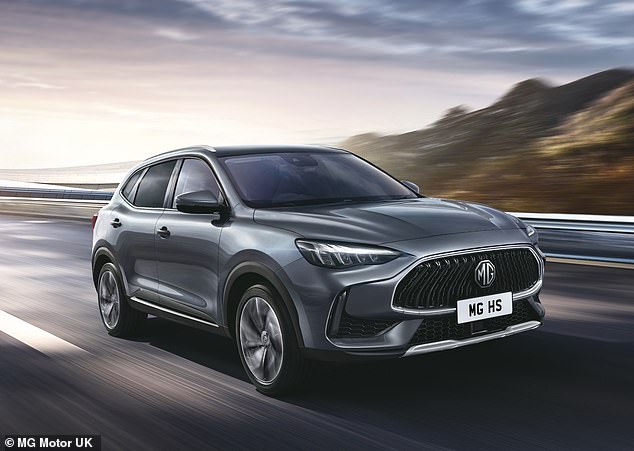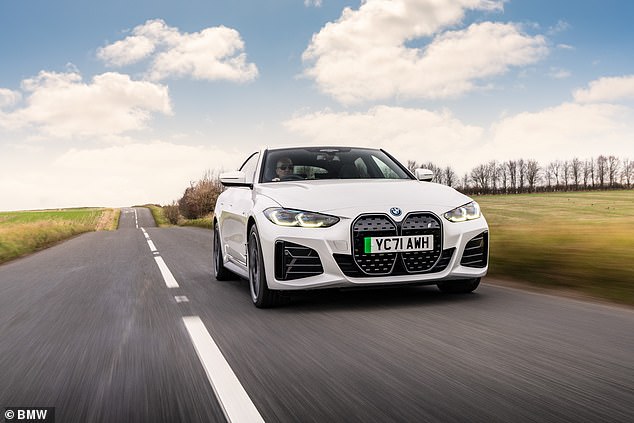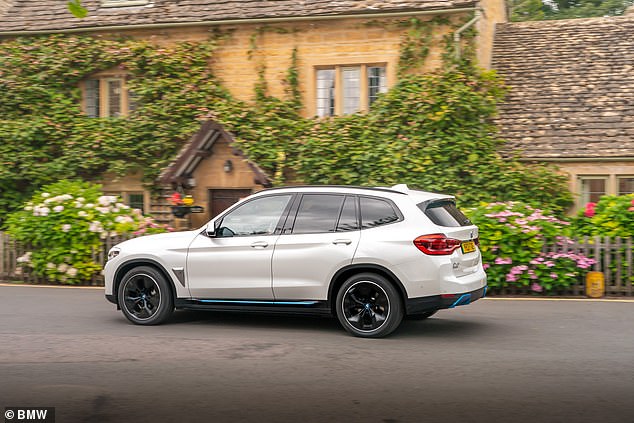The UK’s advertising watchdog has banned adverts from two different car makers that referred to their electric vehicles as ‘zero emissions’ as it continues to crackdown on claims made about battery-powered models.
The Advertising Standards Authority (ASA) said today it had upheld rulings against BMW and MG Motor UK for ads that appeared on Google last year.
It said the both adverts had misled consumers by suggesting EVs do not produce emissions during the manufacturing process – or when they’re being charged by non-renewable electricity.

BMW is one of two car brands to have its knuckles rapped by the Advertising Standards Authority regarding the use of the term ‘zero emissions’ when promoting its electric vehicles online
The paid for Google ad for BMW seen on 16 August 2023 featured the claim: ‘Zero Emissions Cars – Download Your Brochure Today. Visit BMW’s official online website. Find the perfect BMW electric car. Book a test drive. Explore a range of BMW electric cars …’.
On the same day, MG Motor UK also had a paid for Google advert which stated: ‘Find A Dealer – Book A Test Drive. Save £1,000 On Your Next MG HS Plug-in Hybrid, MG ZS or MG5 EV Trophy Long Range Renewed with a modern design, increased range, and even more technology. Zero Emissions’.
The ASA challenged whether the claim ‘zero emissions’ misleadingly represented the vehicles’ environmental impact.
This was especially the case for the MG example, which was also advertising plug-in hybrid models which have a supplementary petrol engine.
The ASA’s ruling said: ‘The basis of the [MG Motor UK] claim in the ad was not explained.
‘A ‘zero emissions’ claim for a fully electric vehicle, that did not make explicitly clear it related to emissions produced when the vehicle was being driven was likely to mislead.
‘Hybrid vehicles emitted greenhouse gases from the tailpipe when the petrol or diesel source was in use. Any associated ‘zero emissions’ claim needed to clarify that it referred to emissions while the vehicle was driven on the electric motor.
‘Similar claims for vehicles powered by petrol or diesel engines would always mislead.’

MG has used the reference ‘zero emissions’ in an advert for electric cars and the plug-in hybrid HS SUV (pictured), despite the fact the latter has a petrol engine

The ASA said both BMW and MG Motor UK had misled consumers by suggesting in their ads that EVs do not produce emissions during the manufacturing process – or when they’re being charged by non-renewable electricity. Pictured: MG5 EV
The ASA ruling added: ‘The ad made the claim ‘Zero Emissions’ without material information that was required to allow consumers to understand on what it was based. It did not differentiate between the vehicle types or clarify that the claim was restricted to emissions when an electric vehicle was being driven.
‘We concluded that the ad, therefore, was likely to mislead.’
BMW responded to the ASA to say it had included the reference in its adverts in a bid to capture the number of people searching online for EVs using the term ‘zero emissions’.
When it came to the BMW advert, the ASA said consumers would wrongfully interpret that those cars would produce zero emissions in all circumstances.
‘We understood that when electric vehicles were driven no emissions were produced, unlike a car with a petrol or diesel engine where emissions came from the tailpipe.
‘However, in other circumstances, such as the manufacture or charging of an electric vehicle using electricity from the national grid, emissions were generated.
‘For that reason an ad that featured a ‘zero emissions’ claim, that did not make explicitly clear that it was related to the reaction of the vehicle while it was being driven was likely to mislead.
‘Without material information to make clear to consumers what the claim was based on and clarification that it was restricted to emissions only when driving, we concluded ‘Zero Emissions Cars’ was likely to mislead.’
Both BMW and MG were instructed that ads must not appear again in their current form and any reference to ‘zero emissions’ in the futures makes clear that the claim relates to an EV only when it is being driven.

BMW responded to the ASA to say it had included the reference in its adverts in a bid to capture the number of people searching online for EVs using the term ‘zero emissions’. Pictured: BMW i4

The ASA says car makers must make clear that any reference to zero emissions only refer to when an EV is being driven. Pictured: BMW iX3
The ASA’s ruling was published on Wednesday alongside one against Transport for London (TfL) radio adverts promoting the expansion of London’s Ultra Low Emission Zone (ULEZ).
The watchdog said that TfL’s claims that nitrogen dioxide (NO2) had reduced by almost half as a result of the scheme were not based on measurements of air quality taken before and after it was implemented, as listeners might expect.
Instead, TfL based its claim on calculating the difference between current air quality measurements and a ‘non-ULEZ scenario’, but without qualifying this for listeners and likely misleading them, the ASA found.
The ASA also upheld complaints about claims in a second TfL ad that most deaths related to air pollution ‘actually’ occurred in outer London, when this was in fact based on modelled estimates.
Colin Walker from green think tank The Energy & Climate Intelligence Unit described the ASA’s ruling as ‘a very strange decision’.
He said it is ‘accepted practice’ that cars of all fuel types are assessed by the CO2 they emit from their exhaust pipes and used the Government’s Zero Emission Vehicle Mandate as an example of how the term is already used to describe EVs.
‘It seems perverse that car manufacturers, in an effort to meet the targets they have been set under this mandate for the number of zero emission vehicles that they have to sell, are being told that they can’t market those vehicles as zero emission,’ Mr Walker told This is Money.
‘The reality is that an EV, from being built to being driven to being scrapped, produces three times less CO2 than a petrol vehicle. And that figure will increase as more renewables continue to connect to the UK’s grid.
‘Set against this decision, one has to wonder why the ASA is happy for the likes of Toyota to greenwash their hybrid vehicles as ‘self-charging’ – as if the electricity in their batteries is magically conjured from thin air, rather than from the petrol that’s burnt in their engines. For clarity, it isn’t.’
ASA’s crackdown on EV terminology in adverts
In 2022, the ASA published its report on consumers’ understanding of commonly used environmental terms, such as ‘carbon neutral’, ‘net zero’ and ‘electric’ and ‘hybrid’ vehicles.
It said that advertisers need to be transparent about claims made around terms including ‘zero emissions’ when describing green products, including EVs.
A spokesperson for the ASA told This is Money: ‘We’ve been regulating environmental claims in ads for years, and we’ve made it clear that any objective claims need to be backed up by robust evidence.
‘When it comes to absolute claims, advertisers need to take into account the full lifecycle of a product, and have robust evidence to support the claims.
‘This is a long-established position, taking into account independent consumer research, which shows claims in ads for electric vehicles aren’t always clearly understood.
‘In this case, both ads said their vehicles were ‘zero emission’ without qualifying what that actually meant.
‘We recognised that electric cars emit zero emissions during use. However, given the emissions emitted during manufacture, and the potential emissions dependent on charging source, we ruled that describing them objectively as ‘zero emission’ was misleading by suggesting that the product had caused no emissions at all.’
The rulings against BMW and MG come just weeks after the ASA rapped the knuckles of both Kia and Mercedes for adverts promoting the ‘official’ maximum range figures for new electric cars, and not the actual range drivers might reasonably expect to achieve.
Some links in this article may be affiliate links. If you click on them we may earn a small commission. That helps us fund This Is Money, and keep it free to use. We do not write articles to promote products. We do not allow any commercial relationship to affect our editorial independence.










